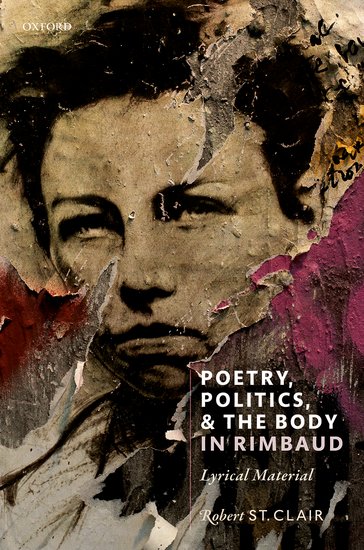
Compte rendu publié dans Acta fabula, dossier critique "L'âge du XIXème siècle" (septembre 2019, vol.20, n°7) : Renaud Lejosne-Guigon https://www.fabula.org/revue/document12303.php
Robert St. Clair, Poetry, Politics, and the Body in Rimbaud. Lyrical Material
Oxford, Oxford University Press
Published: 12 September 2018
288 Pages
234x156mm
ISBN: 9780198826583
Description
Bodies abound in Rimbaud's poetry in a way that is nearly unprecedented in the nineteenth-century poetic canon: lazy, creative, rule-breaking bodies, queer bodies, marginalized and impoverished bodies, revolting and revolutionary, historical bodies.
The question that Poetry, Politics, and the Body seeks to answer is: What does this corporeal density mean for reading Rimbaud? What kind of sense are we to make of this omnipresence of the body in the Rimbaldian corpus, from first to last–from the earliest poems in verse celebrating the sheer, simple delight of running away from wherever one is and stretching one's legs out under a table, to the ultimate flight away from poetry itself? In response, this book argues that the body appears–often literally–as a kind of gap, breach, or aperture through which Rimbaud's poems enter into contact with history and a larger body of other texts. Simply put, the body is privileged 'lyrical material' for Rimbaud: a figure for human beings in their exposed, finite creatureliness and in their unpredictable agency and interconnectedness. Its presence in the early work allows us not only to contemplate what a strange, sensuous thing it is to be embodied, to be both singular and part of a collective, it also allows the poet to diagnose, and the reader to perceive, a set of seemingly intractable, 'real' socio-economic, political, and symbolic problems. Rimbaud's bodies are, in other words, utopian bodies: sites where the historical and the lyrical, the ideal and the material, do not so much cancel each other out as become caught up in one another.
Table of Contents
Introduction
1: (Departures). Natural Bodies: (Eco)Poetics and the Politics of the Aesthetic: "Sensation"
2: (Diagnostic). Impoverished Bodies: "Les Effarés" and the Misery of the Nineteenth-Century Lyric
3: (Prognosis). Happy Bodies, Happy Hours: "Au Cabaret-vert, cinq heures du soir"
4: (Anamnesis). Revolting Bodies: "Le Forgeron" and the Poetry of the Past
5: (Conclusion). Other Bodies: Rimbaud, Verlaine, and L'Idole—Le Sonnet du trou du cul
Robert St. Clair is Assistant Professor of French at Dartmouth College and co-editor-in-chief of Parade sauvage, the international journal of Rimbaud studies.
Plus d'informations sur le site web de l'éditeur...